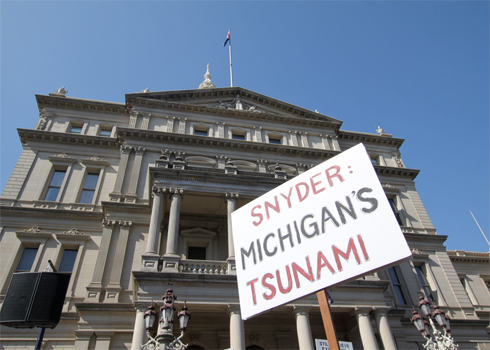Last week when news of their Freedom Of Information Act requests aimed at labor studies professors from state-run universities in Michigan broke, the conservative-leaning Mackinac Center For Public Policy think tank declined to talk about them. But on Monday night, in a long post on the center’s own website, the Mackinac staffer behind the FOIA requests offered a long explanation of why the center wants to know what Michigan labor studies professors were hearing and saying about Gov. Scott Walker (R-WI) and MSNBC’s Rachel Maddow.
The short version: Mackinac’s been at war with labor studies departments for years, and the fight in Wisconsin opened up a new front.
From Mackinac’s Ken Braun, who called for the FOIAs to be sent and then declined to discuss them with TPM, the Detroit Free Press or the New York Times:
We typically do not comment on the purpose of these FOIAs until we see the results, but in the case of the FOIA we submitted last week to three public university labor departments, we have decided to respond to what has become a national debate over whether we — or anyone — should be asking for such information at all. Our answer is that we should, and that these requests are not only proper, but also respectful of the privacy of the labor professors involved.
As Braun explains, Mackinac has long had concerns about the labor studies departments at Michigan’s state run universities. Back in 2010, Braun published a lengthy report aimed at the Labor Studies Center at Wayne State University in Detroit. That story stemmed from a 2005 episode where the Michigan Chamber of Commerce successfully forced Wayne State to remove a student-run project advocating an increase in the minimum wage on 2006 state ballots (the proposal was backed by organized labor and the Democrats and ended up not happening.)
The case, it seems, made Michigan state university labor studies departments in general (and the department at Wayne State in particular) a main target of Mackinac. (Dave Weigel did some reporting on this shortly after news of the recent round of FOIAs were released.)
When Wisconsin came along, Braun says Mackinac saw a way to take on its old rivals:
The unfolding of the Wisconsin turmoil and the pitched debate over the Michigan legislation provided us an opportunity to chase an old story with a FOIA. Specifically, we were interested in determining whether the LSC and the labor faculty at Michigan’s other two large public universities had actively employed university resources to enter the political debates. At a minimum, we thought a FOIA investigating professors’ emails on these subjects might demonstrate whether state officials should ask questions about this use of tax dollars for public universities. In the worst-case scenario, we knew these emails might suggest that the faculty had acted illegally, because certain political uses of university resources are prohibited by Michigan law.
This, essentially, is what the professors Mackinac FOIA’d thought the think tank was after. They have said they think Mackinac — which they suggest is out to get them — is trying to catch them in illegal activity, something they’ve denied.
So that explains the FOIAs about “Wisconsin” and “Scott Walker” and “Madison” Mackinac filed more than a week ago. But what about the requests targeted at emails including Maddow’s name? Braun says it’s just another part of the story. Maddow has spent a lot of time on her show taking aim at Michigan Gov. Rick Snyder’s (R) plan to let the state blow up union contracts with bankrupt Michigan municipalities.
From Braun’s post:
We asked for these emails first because Ms. Maddow had recently criticized at length Michigan’s governor and his labor-related legislation in a TV segment virally circulated on the Web, and second because FOIA requests are an inexact art, much like a Google search. You can ask for everything, and get everything, but not only is it costly to do so (public bodies can charge the fair costs of retrieving public records), it is both time-consuming and needlessly intrusive on the activities of public employees.
Hence, by including emails referring to Ms. Maddow, we were aiming to generate a more narrowly targeted set of emails that nevertheless didn’t depend closely on exact phrases that she or the letter writers might have used and that would have excluded emails relevant to our request.
Read the whole statement here.






